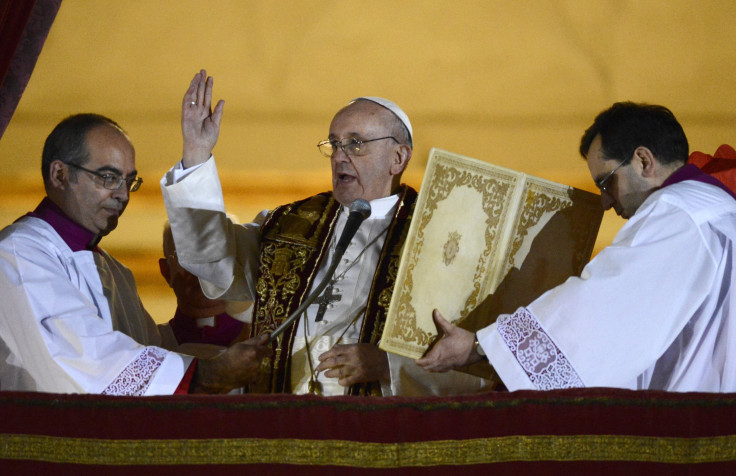Why Cardinal Jorge Mario Bergoglio Will Boost Rome’s Economy As Pope Francis

For the Vatican, the decision to elect former Cardinal Jorge Mario Bergoglio of Buenos Aires as the new leader of 1.2 billion Catholics worldwide was a sacred act. But for secular Rome, the election of Pope Francis was an eagerly anticipated business decision that turned out almost exactly as the city had hoped.
Although billions of Catholics were saddened by the surprise Feb. 11 announcement that Benedict XVI would step down, Rome's tourism industry was ecstatic. Hotel bookings shot up by more than 10 percent -- with one travel site even reporting a 60 percent increase in inquires from Germany, Benedict’s homeland -- helping to pump much-needed revenue into the city during its traditional low season.
Indeed, some 300,000 pilgrims descended on Rome to bid farewell to Benedict XVI this week and to witness a rare, and some might say, outdated ritual steeped in centuries-old tradition -- even though many iconic sites in the Eternal City, including the Sistine Chapel, were closed.
Some hotels near the Vatican have raised rates as much as 1,000 euros ($1,274) a night, while others, like the Metropolis Hotel, imposed only modest increases.
"We're booked up, we've had to turn people away!" Metropolis Director Antonio Galati told the Agence France-Presse. The 55-room hotel, which is only a short walk from St. Peter's Square, is actually a converted 16th-century clergy house. The hotel offered a “conclave package” for visitors, including meals in a former canteen used by Catholic priests for centuries.
Speaking about his preference for the next pope, a day before the big announcement, Galati said, “A South American pope would be great. Or a Mexican. In fact, anyone from the Americas.”
For Galati, and many others around the world, their wish finally came true.
Word that a South American would ascend to the highest post in the Catholic Church was cause for celebration in the Italian capital, and Roman journalists were never shy about their preference in the matter.
Italian daily newspaper La Repubblica headlined a recent article, “We’re Rooting for an American Pope to Bring More Tourists to the Capital.”
It’s well-known Benedict XVI never rose to the superstar-like status of John Paul II, at home or around the world, and Benedict's likeness did little to boost sales at the numerous souvenir shops on Via della Conciliazione. Several local reports said shop owners made more profit on John Paul II paraphernalia after his death, than they ever did with images of Benedict XVI, the first pope in 600 years to voluntarily step down.
With the election of the 266th pope in the Catholic Church's 2,000-year history, there’s widespread renewed optimism that Pope Francis’ likeness may prove more profitable than his predecessor. There's also hope that Catholics in Latin America, who represent about 40 percent of the religion’s faithful, will come in droves to visit Pope Francis' new papal home.
Giuseppe Roscioli, president of Italian hotel association Federalberghi, one of the country's largest, told Il Sussidiario that he expected 10 percent more visitors in Rome for the entire month of March alone.
“We have an average occupancy rate [at hotels] of around 65 percent, so it will be at about 75 percent now,” he said, adding, “There is still plenty of space available.”
In an interview before Wednesday's announcement of a new pope, Roscioli told the newspaper that what happens next depends entirely on the nationality of the new leader.
“Usually, as always happens in these situations, the faithful from the Pope’s home country arrive, but this depends on the country,” he said.
“If it’s a pope from New Guinea, there will not likely be a large influx. If it is, however, a South American … then maybe the flow would increase, as we’ve seen in past years.”
Roscioli noted the media presence and headlines around the world were invaluable to the city and provided the type of advertising that would otherwise be impossible to afford.
For tourism-dependent Rome, where the Vatican is arguably the star attraction, the announcement of Pope Francis is only the beginning. Next week is the papal installation, and presidents, prime ministers, religious leaders and thousands of pilgrims will flock to St. Peter’s Square to hear the new pope's first speech.
Vice President Joe Biden will lead a U.S. delegation to Rome for the occasion, which will be held on Tuesday.
While no one knows exactly how many people will descend on Rome for the pope's installation, Mario Vallorosi, head of the Rome office of the government’s Civil Protection service, said on Monday, before the election, “If the new pope is Latin American, he will draw huge crowds.”
The tourism buzz is unlikely to end after the formalities unfold. The Catholic Travel Center and other travel agents have noted that prospective visitors are already planning for trips toward the end of 2013 and into the new year.
“We’re already seeing significant interest in people organizing travel for next year to be in Rome to see the new pope because it’s a big deal,” Scott Scherer, owner of Catholic Travel Center, told NBC News. “It’s certainly something that animates the entire Catholic world.”
And, by association, Rome.
© Copyright IBTimes 2024. All rights reserved.












